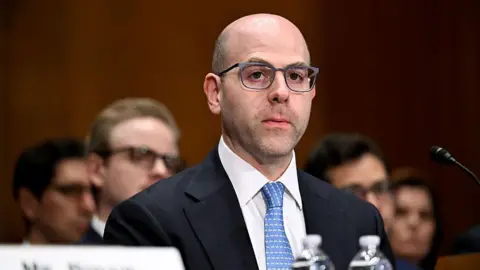Business
How an AI notetaker became one of the few profitable AI startups

Nathan Xu’s bootstrapped company has sold more than 1 million AI recording devices that transcribe and summarise the busy days of doctors, lawyers and business people — and he’s just getting started.
On a rainy July morning in a plush Amsterdam suburb, Nathan Xu has camped out at an Italian coffee shop for a full slate of meetings. Smiling, he asks if he can record our conversation and clips a slim memory stick-sized device to his shirt.
With just a click, the pill-shaped gadget starts recording, transcribing and summarizing everything he says — and everything anyone around him says too. The device, made by Xu’s San Francisco and Shenzen, China-based startup Plaud, can on a single charge capture 20 hours of recordings, turning that into searchable transcripts by connecting its microphones with Plaud’s own software and a bundle of AI tools like ChatGPT.
Dubbed the NotePin, the gadget has found a fast growing audience. Since launching in 2023, Xu has sold over 1 million such devices to doctors, lawyers, and other overworked folks with long days and short memories.
That makes Plaud an early front-runner in the race to move artificial intelligence tools out of your phone or laptop and onto your body. Xu’s team has already lapped some early American competition like Rabbit and the now defunct Humane that promised an AI-powered helper but delivered costly duds. Investors have plowed close to $350 million in the space with a new crop of startups like Omi and Limitless releasing wearables, while Amazon just snapped up Bee, a tiny note-taking device startup, for an undisclosed amount. In May OpenAI spent a stunning $6.4 billion to bring iPhone designer Jony Ive’s future AI device inhouse.
Plaud and its ilk are taking advantage of shifting norms in the tech industry where AI note taking bots are increasingly common participants in a conference call. With many shrugging off such transcriptionists inside the office, etiquette around recording outside the office is fraying. “Now, I assume that everything, even coffee meetings, are being recorded,” said New Wave VC cofounder Pia d’Iribarne, who backed Bee.
Well aware of the sprawling privacy implications of ubiquitous personal recording devices, Xu is careful to position Plaud devices as professional tools, not gadgets made to surreptitiously capture dinner table conversations. “We always recommend users get consent before they start recording,” he says carefully.
“In the next decade, every single person is going to have a wearable AI device.”
Nathan Xu, cofounder and CEO, Plaud AI
Unlike many AI companies Plaud not only makes money — it’s profitable. Between sales of the $159 NotePin and revenue from annual transcription plans starting at $99, the company is on track to bring in $250 million in annualized revenue this year with Xu bragging about margins on par with Apple’s 25% on every iPhone sold.
And unlike its rivals, Plaud has done it without handouts from venture capitalists. Xu, 34, bootstrapped the company by pooling his savings with his older cofounder Charles Liu, a Shenzhen factory owner, and launching a $1 million crowdfunding campaign. The pair still own the vast majority of the business. But competition is heating up and Plaud is facing a growing cohort of startups hoping their personal AI device can bite off a chunk of the $540 billion annual smartphone market.
“In the next decade, every single person is going to have a wearable AI device,” said Xu. “It will be more popular than smartphones.”
Before he started dabbling in AI, Xu was a Wuhan University graduate on a path to a dull but respectable career in banking until a class on innovation inspired him to create his own business — a website to help Chinese students pick and apply for colleges abroad.
He got a quick reality check when his idea turned out to be a dud that drained the cash his parents set aside for a masters degree. Xu’s second and third startups were equally ill starred, and he eventually found more success as a venture capitalist. During his first gig as an investor at Beijing-based fund China Growth Capital, Xu backed startups like Indonesian digital bank Akulaku, which is now valued at $2 billion. “He was always trying to find ways to be part of the frontier,” said Wayne Shiong, China Growth Capital’s cofounder. “Nathan is more of a Silicon Valley type than the typical Chinese entrepreneur.”
By 2021, he was itching to build another startup. On long trips to Shenzhen, the crucible for China’s electronics and hardware manufacturing, he spotted an opportunity: Local factories were churning out a baffling array of pens, bracelets and pendants with smart recorders, and transcription apps from the likes of Google were racking up downloads in the billions. But outside China, dictaphones were a dusty product line for slow-moving conglomerates like Sony, Olympus and Philips. Xu’s bet was that slick hardware with AI-powered tools would click with international shoppers.
He first teamed up with factory owner Charles Liu, a veteran builder of wearables like smart watches, on a tiny app-controlled recorder marketed for catching cheating spouses, named Izyrec. It was a hit but the pair saw a much bigger opportunity with the launch of ChatGPT in 2022, and wanted to start again with a cleaner brand. So they pivoted to Plaud, launching a Kickstarter campaign 2023 for the Note, a credit card-sized recording device that could stick to the back of a smartphone, designed for frantic business people running between meetings.
It netted over $1 million in pre-orders, despite the Plaud Note being three times the price of its Izyrec predecessor, with largely the same technical specs. This time though, it came bundled with an app powered by ChatGPT that would transcribe and summarize calls. Now Xu and his cofounder weren’t just selling gadgets — through the app they began selling a premium service that offered time-saving transcripts and summaries. “I wanted to create a beautiful business and software gives it a moat and sustainability,” he said.
They stuck to an international market: The twin threats of Xiaomi and Huawei’s slick AI-enabled wearables and Shenzhen’s army of copycat factories convinced them to only sell overseas. “In China you’re going to have overnight competition and will always have to compete hard on price,” said Xu.
When Xu started to realize that some of Plaud’s biggest fans were folks in meeting-heavy roles like doctors, lawyers and sales people, he began to build templates for common scenarios like patient consultations and sales calls. Earlier this year, Plaud acquired a small San Francisco-based startup building software for hospitals, hoping to speed the company’s move into healthcare. That gave them a crack at another booming market crowded with competition from billion-dollar startups like Abridge and giants like Microsoft-owned Nuance, which make AI transcription tools for doctors.
Last week, Xu met with journalists and tech bloggers in San Francisco for the launch of Plaud’s latest device: a new “pro” version of its Note device, now with a bigger battery, longer recording time and a tiny screen.
“I’d like to be on the front page of the newspaper for having a big IPO, not for recording all of America’s conversations with Chinese technology,”
Dan Weirich, general partner, Carbide Ventures
Xu wasn’t just in the United States for the product launch. He opened a Plaud office in San Francisco in 2023, and he’s now based there, along with 20 members of Plaud’s 200-strong team. “We have the best talent in Shenzhen for hardware design, and the best engineers in San Francisco for AI development,’ says Xu. But with the growing tensions between Washington D.C. and Beijing he’s keen to reinforce that Plaud is an American company. It’s registered in Delaware and its user data is securely stored in Amazon data centers on U.S. soil.
Dan Weirich, a Bay Area-based partner with Carbide Ventures who invested around $5 million in Plaud earlier this year, thinks that’s wise. “I’d like to be on the front page of the newspaper for having a big IPO, not for recording all of America’s conversations with Chinese technology,” he said.
Aside from geopolitics, covert taping of conversations with diminutive body-worn devices poses all kinds of ethical and legal issues. States like California have tough but rarely enforced laws for recording conversations without consent that can lead to fines or jail time.
Xu thinks Plaud’s focus on business meetings will keep it in safe territory. “We are going to be entirely productivity oriented,” he said. “We don’t mess with life at all.”
Dan Siroker, cofounder of Limitless, which sells an always-listening AI device to “augment” human memory, thinks such concerns are overblown and that fear of everything being recorded will pass. “If you remember the first smartphone everyone was paranoid about the camera. It was the end of privacy,” he says,
So were many of Silicon Valley’s other attempts to fully digitize our lives. Technologist Steve Mann used a wearable camera to post his life online way back in 1994, while the idea for video game streamer Twitch was born from cofounder Justin Kan live-broadcasting his every waking moment over an eight-month-period starting in 2007. Fans of Google’s smart glasses were derided as “glassholes,” but a decade on Meta is on track to sell two million pairs of its own AI Ray-Ban shades, which can record hundreds of photos and videos, this year.
Among the AI notetakers, Xu has a lead — for the time being. He’s keen to bolster Plaud’s balance sheet not only to put more American bums in board seats but to pull together a “$500 million” war chest. That’s lofty talk when wearable-maker Fitbit, which was selling $1.43 billion a year of its fitness tracker, was snapped up by Google in 2019 for just $2.1 billion. Xu has so far only raised small amounts from investors like Weirich’s Carbide Ventures and angel investor Patrick Kavanagh at an undisclosed valuation.
Still, around half of Plaud’s revenue now stems from its annual AI subscriptions, and Xu is pushing to build more tools to help business users, which could drive a valuation more inline with that of medical transcription startup Abridge, which was last valued at $5.3 billion. Then again, Apple or Google could just blow Plaud and its rivals out of the water with an app tweak, or a new device. The Cupertino-based giant has already quietly bundled free transcriptions of voice memos into its Apple Intelligence update and Zoom, Microsoft, and startups like Granola offer similar note-taking tools.
At least one former Apple insider thinks that Plaud is likely to end up as another evolutionary digital dead end, like other forgotten gadgets like Tivo TV recorders. “You have to look at each of these devices and say: ‘Are these merely features or a product?’” said Tony Fadell, one of the creators of the iPod and founder of Google-acquired Nest.
Xu is betting that it will be Apple or Microsoft to crack the code on a truly groundbreaking new AI device but that could be years away. Until then, Plaud has a loyal slice of well-heeled white collar workers that don’t want a phone call to interrupt their recording, and will pay up for the extra microphone and battery life. Xu also has bigger ideas not just for new ring-shaped, or ear bud-style gadgets, but how Plaud can “amplify human intelligence”. “It’s going to be an AI work companion and not just a voice recorder device,” he says.
Look back on the week that was with hand-picked articles from Australia and around the world. Sign up to the Forbes Australia newsletter here or become a member here.
Business
Jaguar Land Rover staff to stay home after cyber attack

Jaguar Land Rover (JLR) has instructed factory staff to stay at home until at least Tuesday as the company continues to grapple with the fallout from a cyber attack.
The attack at the weekend forced the company to take vital IT systems offline, which has affected car sales and production.
Production remains halted at car factories in Halewood on Merseyside and Solihull in the West Midlands, as well as at its engine manufacturing centre in Wolverhampton.
The situation remains under review and output could remain suspended for longer.
Car sales have also been heavily disrupted, although the BBC understands some transactions have been able to take place.
The company, which is owned by India’s Tata Motors, shut down its systems on Sunday in order to limit potential damage from the cyber attack.
It is now working to restore them in a controlled manner, but this is understood to be a highly complex process. It is also introducing work-arounds for systems that remain offline.
The attack occurred at what is traditionally a popular time for consumers to take delivery of a new vehicle. The latest batch of new registration plates became available on 1 September.
The disruption extends well beyond JLR’s own production lines, with its network of parts suppliers also forced to restrict their operations. Some have complained of a lack of transparency from the company.
On Wednesday a hacker group which was also responsible for a highly damaging attack on Marks and Spencer earlier in the year said it had infiltrated JLR’s systems.
The group of young English-speaking hackers – who are thought to be teens calling themselves “Scattered Lapsus$ Hunters” – told the BBC how they allegedly accessed the car maker but have not revealed if they successfully stole private data from JLR or installed malicious software onto the company’s network.
The group posted two images, which showed apparent internal instructions for troubleshooting a car charging issue and internal computer logs.
A security expert said those screenshots suggested the group had access to information they should not have.
JLR says it is investigating the hack, but there is no evidence at this stage any customer data has been stolen.
In 2023, as part of an effort to “accelerate digital transformation across its business”, JLR signed a five-year, £800m deal with corporate stablemate Tata Consultancy Services to provide cybersecurity and a range of other IT services.
The halt in production is a fresh blow to the firm which recently revealed a slump in profits attributed to an increase in costs caused by US tariffs.
Business
Trump’s Fed pick Stephen Miran says he will keep White House job

 Bloomberg/Getty
Bloomberg/GettyPresident Donald Trump’s pick to fill a vacancy on the Federal Reserve said he did not plan to resign from his role at the White House, if confirmed, raising alarm among Democrats who said his elevation would bring the president closer to controlling the central bank.
Stephen Miran, currently chief of Trump’s Council of Economic Advisers, told lawmakers at his confirmation hearing on Thursday that he intended to take a leave of absence from the White House, given the short term nature of the Fed post.
He assured them that he would act independently if confirmed.
But he demurred when Democrats demanded he prove his independence by going on the record saying Trump had lost the 2020 election.
He also ducked questions asking him whether the president was right when he claimed that officials had faked jobs data for political reasons and on his past recommendations for Fed overhaul, including warnings against naming political figures to the board.
Senator Elizabeth Warren, a Democrat, said Miran would be seen as a “puppet” who would not be trusted as an independent voice.
“You have made clear that you will do or say whatever Donald Trump wants,” she told him. “That may work in a political position but it will take an axe to Federal Reserve independence.”
Miran called the independence of the Fed “paramount” and said he had not been asked by anyone at the White House to commit “formally or informally” to lowering interest rates.
“The independence of the Federal Reserve is critical to delivering superior long-run outcomes for the economy,” he said.
Miran, who trained as an economist at Harvard, was named by Trump to finish out the term of former governor Adriana Kugler.
Kugler resigned last month, a few months before her time on the board was due to end in January.
The opportunity came as Trump has put unprecedented pressure on the Fed to lower interest rates, toying with the idea of firing chair Jerome Powell and taking steps to fire another board member, Lisa Cook, over allegations of mortgage fraud.
She has denied those claims and challenged the president’s termination in court.
Economists say Trump’s campaign risks undermining the credibility of the bank, which is charged with keeping prices and employment stable and has been designed to set policy independently from the White House.
Lawmakers from both parties told Miran that it was critical that the bank’s governors determine interest rates without regard to politics.
But while Republicans widely indicated they would support his confirmation, Democrats said Miran’s decision to maintain his White House post was a sign he would be responsive to Trump’s demands.
Senator Jack Reed of Rhode Island called the arrangement “ridiculous”, while Senator Andy Kim of New Jersey asked: “Why do you even want this job for four months if you’re just hedging your bets and continuing your role at the White House?”
Miran said would resign his White House post, if he was nominated to serve a longer term.
Miran’s nomination is expected to advance to a full vote in the Senate, where Republicans hold a majority.
Senator John Kennedy, a Republican, urged Miran to ignore political considerations if confirmed.
“You’ve got to call them like you see them and ignore – nothing wrong with people giving their advice – but ignore all the rhetoric,” he said.
Warren said Republicans were ignoring the “elephant in the room” in their willingness to green-light Miran’s elevation.
“If we allow the Fed to become a political football, every American consumer, every American worker and every American business will pay a long term price,” she said.
Business
Demand for second-hand school uniform rises across Somerset

Charities and community groups have seen a rise in demand for second-hand school uniform.
Barnardo’s in Frome has put out an appeal for donated uniform, due to the high demand they are seeing, and parents in Somerset have set up Facebook groups to help.
The Community Hub in Chard has started a pre-loved school uniform shop which operates on the basis of paying what you can afford to help parents who may not be able to afford it.
Tessa Goodridge-Reynolds, from the Chard Community Hub, said: “It’s pay-as-you-can so there’s no pressure to donate at all. We just want to remove that pressure. It’s a really expensive time for parents.”
Ms Goodridge-Reynolds helped to set up the uniform shop in 2022, led by the need from the community.
“They found it difficult to get hold of uniform cheaply,” she said.
“Part of it is sustainability, too. Isn’t it great if we can swap and share and get as much use out of clothes as possible?
“Today, more than 1,300 items have gone out to families. It’s a busy time of year, everyone getting ready for school this week.”
Nikki Allen, a mum from Somerset, set up the South Somerset School Uniform Exchange group on Facebook.
“It was a few years ago when my son was still in school. I was looking for bits of uniform that I didn’t really want to buy new,” Ms Allen said.
“There’s posts every day, whether it’s school uniform or coats. People are really pleased to get something for less money because of course budgets are tight still.”
Barnardo’s in Frome said they have also seen a surge in demand for uniform.
They have been recycling uniform for the last four years but demand is now is at its highest ever, with parents queuing up to get uniform and PE kits for their children.
Hannah Smith, the store manager, said: “There’s been a lot more demand, I’ve had messages, phone calls asking for uniform.
“It’s definitely the cost of living, people just can’t afford it new anymore and they’re struggling.
“Just for a general Frome college uniform you’re looking at £100, just for one set.”
-

 Business6 days ago
Business6 days agoThe Guardian view on Trump and the Fed: independence is no substitute for accountability | Editorial
-
Tools & Platforms3 weeks ago
Building Trust in Military AI Starts with Opening the Black Box – War on the Rocks
-

 Ethics & Policy1 month ago
Ethics & Policy1 month agoSDAIA Supports Saudi Arabia’s Leadership in Shaping Global AI Ethics, Policy, and Research – وكالة الأنباء السعودية
-

 Events & Conferences4 months ago
Events & Conferences4 months agoJourney to 1000 models: Scaling Instagram’s recommendation system
-

 Jobs & Careers2 months ago
Jobs & Careers2 months agoMumbai-based Perplexity Alternative Has 60k+ Users Without Funding
-

 Education2 months ago
Education2 months agoVEX Robotics launches AI-powered classroom robotics system
-

 Funding & Business2 months ago
Funding & Business2 months agoKayak and Expedia race to build AI travel agents that turn social posts into itineraries
-

 Podcasts & Talks2 months ago
Podcasts & Talks2 months agoHappy 4th of July! 🎆 Made with Veo 3 in Gemini
-

 Podcasts & Talks2 months ago
Podcasts & Talks2 months agoOpenAI 🤝 @teamganassi
-

 Education2 months ago
Education2 months agoMacron says UK and France have duty to tackle illegal migration ‘with humanity, solidarity and firmness’ – UK politics live | Politics



















